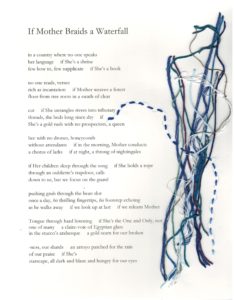We are pleased to announce the 2020 Association for Mormon Letters Awards finalists in Novel, Poetry, Short Fiction, and Short Fiction Collection. The final awards will be announced and presented on June 5, as part of the Association for Mormon Letters Virtual Conference. We will be announcing the other category finalists over the coming week, including Audiobooks, Comics, Creative Non-Fiction, Criticism, Drama, Film, Middle Grade Novel, Picture Book, Podcast, Religious Non-Fiction, and Young Adult Novel, as well as two lifetime awards. The finalists and winners are chosen by juries of authors, academics, and critics. The announcements include book blurbs and author biographies, adapted from the author and publisher websites.
Novel
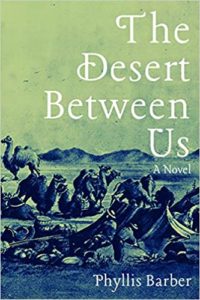 Phyllis Barber. The Desert Between Us. University of Nevada Press.
Phyllis Barber. The Desert Between Us. University of Nevada Press.
A sweeping novel based on the U.S. government’s decision to open more routes to California during the Gold Rush, and import seventy-five camels from the Middle East. Geoffrey Scott, one of the roadbuilders, decides to venture north to discover new opportunities when he—and the camels—are no longer needed. Geoffrey arrives in St. Thomas, Nevada, a polygamous settlement caught up in territorial fights over boundaries. There, he falls in love with Sophia Hughes, a hatmaker obsessed with beauty and the third wife of a polygamist. When faced with the opportunity to move away from her tumultuous life in St. Thomas, Sophia becomes tormented by a life-changing decision she must face alone.
Phyllis Barber lives in Park City, Utah. She’s been writing award-winning stories, articles, essays, and books for over thirty-five years, including the short story collections The School of Love (1990) and Parting the Veil: Stories from a Mormon Imagination (1999), the novel And the Desert Shall Blossom (1991), the children’s book Legs: The Story of a Giraffe (1991) and the memoirs How I Got Cultured: A Nevada Memoir (1992-AML Award winner), Raw Edges: A Memoir (2010), and To The Mountain: One Mormon Woman’s Search For Spirit (2014). She was presented with the Smith-Pettit Foundation Award for Outstanding Contribution to Mormon Letters in 2016.
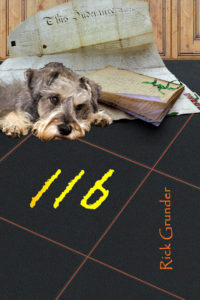 Rick Grunder. 116. BookBaby.
Rick Grunder. 116. BookBaby.
A Biblio Mystery with a dog and a twist! Sol and Anna Slyde sit down to dinner at their forest home in rural New York and hear a message on the answering machine that will change and threaten their lives. A bizarre manuscript has been missing since 1828, and the mysterious caller from the West is sending Sol a huge retainer to find it. Plunge into an unfamiliar culture at a lake town in western Idaho, then on to Utah and finally East. Their billionaire client opens doors they can’t afford to close, but there is always a price.
Rick Grunder holds a master’s degree in history from Brigham Young University where he served as the first Chairman of the BYU Library Bibliographic Department until 1981 and then an antiquarian bookseller for forty years. Set deep in the woods of Central New York, Rick Grunder-Books is located an hour’s drive from Palmyra. He is the author of the five-volume historical reference work, Mormon Parallels: A Bibliographic Source (2008-2018), and the co-author with Will Bagley of “‘I Could Hardly Hold the Pen’: Phebe Ann Wooley Davis’s Hard Road to Utah and Back, 1864–1865,” Overland Journal (Fall 2009), and (with Paul E. Cohen) “The Founding Document of the Mormon West,” Utah Historical Quarterly (Summer 2019). 116 is his first published novel.
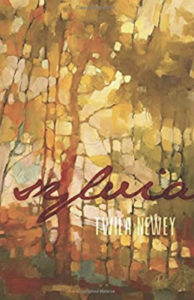 Twila Newey. Sylvia. BCC Press.
Twila Newey. Sylvia. BCC Press.
In the tradition of the finest literary fiction of the American West, Twila Newey weaves together the frailty and warmth of family ties with the mountain landscape’s casual cruelty and transcendent beauty. Four bereaved sisters face the limits and comforts of their faith in one another and in their religious community, and in the process illuminate the frank humor, dangers, and graces of Utah women’s lives in ways that will delight and haunt readers long afterward. —Therese Doucet, author of Prisoner of the Castle of Enlightenmen.
Twila Newey grew up in Provo, Utah. She earned a B.A. in English from Brigham Young University and an M.F.A. in Writing and Poetics from the Jack Kerouac School of Disembodied Poetics at Naropa University in Boulder, Colorado. She was a finalist for The 2019 Coniston Prize at Radar Poetry and received honorable mention in the 2019 Juxtaprose Poetry Contest. She is also a poetry reader for Psaltry & Lyre. Twila lives in the San Francisco Bay area with her husband and four children. Sylvia is her first published novel.
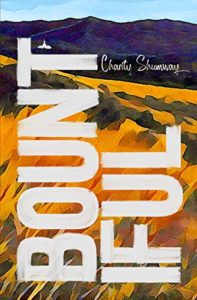 Charity Shumway. Bountiful. BCC Press.
Charity Shumway. Bountiful. BCC Press.
With all five of her children now grown, devout Mormon and lifelong homemaker Nedra Walker is surprised to find her ambitions ignited by an open seat representing Bountiful in the Utah state legislature – an unexpected political turn after decades of domestic life. Nedra’s second daughter, Heather – single, nearing thirty, and freshly returned to Utah after years away for graduate school – is pulled into her mother’s campaign for office. But despite her best efforts, Heather’s progressive political stances create ongoing conflicts with her mother and threaten her first real (and, she worries, her last) chance for a successful LDS marriage. All of which makes Heather question what she really wants anyway.
Charity Shumway is the author of the novel Ten Girls to Watch (Washington Square Press, 2012). She earned an MFA in creative writing from Oregon State University and a BA in English from Harvard College and graduated from Viewmont High School in Bountiful, Utah. She and her family now live in New York.
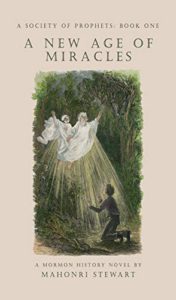 Mahonri Stewart. A New Age of Miracles. Prospero Arts and Media.
Mahonri Stewart. A New Age of Miracles. Prospero Arts and Media.
Joseph Smith would grow to become one of the most influential and controversial figures in American religious history, a person who millions would come to call a prophet of God. Yet, he was once just a young teenager in a large family of poor farmers and laborers, a barefoot boy seeking his own personal salvation. The story he got caught up in–one that claims angels, seer stones, new scripture, religious contention, treasure digging, visions, and a magical, spiritual world striving to emerge in 19th century America–is a tale that strains credulity while it inspires the spiritual imagination. Could so much have really happened in a world that was striving towards modernity? This novel takes the supernatural and spiritual dimensions of the Mormon story seriously and works with the thesis that such events truly transpired. However, it doesn’t paint a sanitized, Sunday school version of its historical figures, but meets them in their all too human faults and controversies, recognizing that they were complex and compelling human beings.
Mahonri Stewart is a national award winning playwright, novelist, screenwriter, poet, theatre producer, and educator. He is the editor of Saints on Stage: An Anthology of Mormon Drama, and has published several of his plays, including The Drowned Book: The History of William Shakespeare, Part Last; Farewell to Eden; Evening Eucalyptus and Other Enchanted Plays; A Roof Overhead and Other Plays; and The Fading Flower. Mahonri is the recipient of the Kennedy Center American College Theater Festival’s National Playwriting Award (second place); the LDS Film Festival’s Screenwriting Award; the 2012 AML Drama Award (for A Roof Overhead), and an AML Lifetime Achievement Award. He received his Bachelors in Theatre Arts degree from Utah Valley University and his Master of Fine Arts degree in Dramatic Writing from Arizona State University.
Poetry
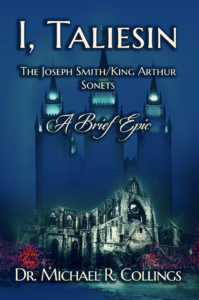 Michael R. Collings. I, Taliesin. Independent.
Michael R. Collings. I, Taliesin. Independent.
I, Taliesin is a brief epic in some sixty sonnets, using Arthurian motifs to present vignettes of moments from the life of Joseph Smith and the founding of the Church of Jesus Christ of Latter-Day Saints.
Taliesin Contemplates the Wound
It might have been an arm, a shoulder blade,
A rib (the thirteenth, harkening to its mate),
A hip-joint traitor-turned to cowled leg,
Or even an eye obscured by unseen mote;
It could have been any of these—his body
As it turned against the child-man within;
But no, it was his leg, infected badly
By microscopic darkness, a whirlwind
Of blood, destroying it—that simple—to kill
The King before his crown could fit full-forged.
But excised—bone cut out with bloody skill—
Removed, the sickness could no longer gorge
Itself on him, and died. Wounded, lamed,
He bore its lifetime-scars, this Fisher-King.
Michael R. Collings, recipient of the 2016 Grand Master Award from the World Horror Convention, is a three-time finalist for the Horror Writers Association annual Bram Stoker Award, twice for poetry and once for non-fiction. He has written over 120 books, including bestselling horror novels, mysteries, science fiction, and poetry. Among his poetry are The Nephiad, a Miltonic epic based on episodes from the Book of Mormon; and Temple and Cosmos, exploring spirituality in science fiction and religion. He has written book-length studies of works of contemporary popular authors, including Stephen King and Orson Scott Card. A professor emeritus from Pepperdine University, he is a professional editor and reviewer as well, with multiple contributions at JournalStone.com, Hellnotes.com, in the print journal Dark Discoveries, and at michaelrcollings@blogspot.com.
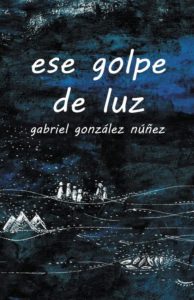 Gabriel González Núñez. Ese golpe de luz. FlowerSong Press.
Gabriel González Núñez. Ese golpe de luz. FlowerSong Press.
Este poemario existe por dos causas distintas pero entrelazadas. La primera es que, como todo aquel que escribe poesía, he leído muchos poemas en mi vida. Es natural que, de tanto leer a Neruda y Benedetti y Machado y tantos otros, vivos y muertos, quiera uno ensayar algo de todo eso. Así que cuando me puse a escribir utilicé las formas que conocía y que de un modo u otro me resultaban especialmente interesantes: el espacio expresivo del verso libre, la estética minimalista del haikú, la sonoridad rítmica del soneto y así sucesivamente.
Nauvoo
Blanco, despierta el pueblo bien helado
Blanca, la mañana abre en su pureza.
Blanca, la neblina flota en pereza.
Blanco, reluce el río congelado.
Blanco, resplandece el templo sagrado.
Blanca, tu capa de nueva princesa.
Blanca, tu mirada de real alteza.
Blanco, es el sí por ti pronunciado.
Dando unos pasos, atrás ya dejamos
el templo bordeado por un halo,
y el horizonte juntos contemplamos.
Hacia algún lugar que a ver no alcanzamos
con un dedo esperanzado señalo
y te susurro al oído: «Allá vamos…»
Gabriel González Núñez is a professor at the University of Texas Rio Grande Valley where he trains translators and interpreters.He earned his Ph.D. in Translation Studies at KU Leuven, where he was a Marie Curie Actions fellow. He is a founder of the Spanish Mormon literature association La Cofradía de Letras Mormonas, and editor of its newsletter, El Pregonero de Deseret. He is the author of Estampas del Libro de Mormón (2018), lyrical first-person character sketches depicting different Book of Mormon figures, and a set of children’s books, including Me llamo Juana y así me hice poeta (Penguin Random House Uruguay, 2019). His poem cycle “El Ciclo” (The Cycle) was published in 2020 by the Center for Latter-day Saint Art. Ese golpe de luz is the first Spanish-language work to be an AML Award finalist.
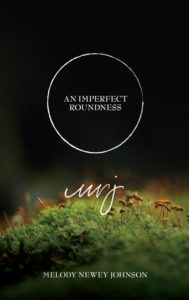 Melody Newey Johnson. An Imperfect Roundness. BCC Press.
Melody Newey Johnson. An Imperfect Roundness. BCC Press.Love Is A Paper Crane
One morning after rain
you lay together listening
as birds chirp and bathe
you realize what began
in two dimensions–
(perfect in its simplicity)
has folded back on itself
creased by careful words
pressed with passion
into three dimensions
love has become more
than you envisioned
when you first lifted it
from the shelf and laid it
on the fine wood table.
Melody Newey Johnson’s poems have been published online and in literary journals and anthologies, including Dialogue: A Journal of Mormon Thought, Exponent II, Irreantum, Utah Voices 2012, Utah Sings, Vol. VIII and elsewhere. Additional works are forthcoming in Blossom as the Cliffrose: Mormon Legacies and the Beckoning Wild, Torrey House Press. She is the current poetry editor for Segullah journal and a past poetry editor for Exponent II magazine. She is the creator of Living Well: Retreat to Self, a women’s writing retreat. She earns a living as a Registered Nurse in Utah and lives to write.
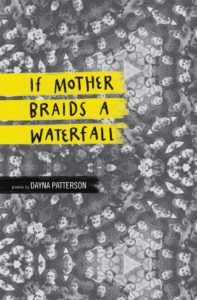 Dayna Patterson. If Mother Braids a Waterfall. Signature Books.
Dayna Patterson. If Mother Braids a Waterfall. Signature Books.
In her debut collection of poetry and lyric essay, Patterson grapples with a patriarchal and polygamous heritage. After learning about her mother’s bisexuality, Patterson befriends doubt while simultaneously feeling the urge to unearth a feminist theology, one that envisions God the Mother taking pride of place at the banquet table.
Dayna Patterson is the author of Titania in Yellow (Porkbelly Press, 2019). Her creative work has appeared recently in Gulf Coast, Ruminate, Sugar House Review, Thrush, and Tupelo Quarterly. She is the founding editor-in-chief of Psaltery & Lyre and a co-editor of Dove Song: Heavenly Mother in Mormon Poetry. She was a co-winner of the 2019 #DignityNotDetention Poetry Prize judged by Ilya Kaminsky, and she has been a Sustainable Arts Fellow at Mineral School Artists Residency.
Short Fiction
Ryan Habermeyer. “Every Nerve Singing”. Fugue 58, Winter/Spring 2020.
“Nobody believes me when I tell them how I became a jellyfish. It’s no mystery. It happened years ago, maybe centuries. I don’t remember. Time is measured differently for jellies. We are invertebrates. You’d be surprised how senseless a spine can make you.”
Ryan Habermeyer’s debut collection of short stories, The Science of Lost Futures (2018), won the BoA Editions Short Fiction Prize and the AML Short Fiction Collection Award. He received his PhD from the University of Missouri and an MFA from UMass Amherst. His stories and essays have twice been nominated for the Pushcart Prize. His work most recently appeared in or forthcoming from Bat City Review, Hotel Amerika, and the Los Angeles Review, among others. He teaches creative writing at Salisbury University.
M.K. Hutchins, “Upcycling Death”. Brain Games: Stories to Astonish
“Death looked into Marjorie’s shop through the street widow. She was holding a blue-and-white plaid men’s shirt. Extra large. Her favorite size.”
M. K. Hutchins’ YA fantasy novel Drift (2014) is both a Junior Library Guild Selection and a VOYA Top Shelf Honoree. Her second novel, The Redwood Palace, was published in 2019. Her short fiction appears in Orson Scott Card’s Intergalactic Medicine Show, Podcastle, Daily Science Fiction, and elsewhere. She studied archaeology at BYU, which gave her the opportunity to compile histories from Maya glyphs, excavate in Belize, and work as a faunal analyst. She lives in Utah.
William Morris. “Certain Places”. Dialogue 53:2, Summer 2020.
“He folds his sash, his apron, his robe. Stacks them on the cold laminate counter. Places the cap on top. Slides the sacred items into the white cotton envelope. The fabric is thin and the light in the changing room is very bright, which means he can see the green of the apron and the pleats of the robe through the envelope. He feels like they should be placed in something more protective. A hard case. A shell. Something that separates them more firmly from the world outside. The world that is not the temple. But then again, they are just articles of clothing. They are sacred because he views them as such. Because he believes in what they represent.”
William Morris is the author of the story collection Dark Watch and other Mormon-American stories, which was an AML award finalist. He received an AML Criticism Award in 2005 for his literature blog A Motley Vision. He co-edited the anthologies Monsters & Mormons and States of Deseret (both from Peculiar Pages). His Mormon alternate history story “The Darkest Abyss in America” received first place in Dialogue’s honoring of 2016 fiction submissions. You can hear an audio version of the story at Dialogue Out Loud Podcast.
Ryan Shoemaker. “The Water Between Us”. Barzakh 12, Spring 2020.
“Lately when I call her at work, she’s taken to firing off questions, like she’s in the habit of keeping pace with the ringing phones and hurried conversations around her. With all those questions, she winds pretty easy. Just the realities of pregnancy, I guess. But maybe it’s more than that. Now she’s all business at work, all efficiency, nothing wasted. No idle chitchat. Just the facts.”
Ryan Shoemaker’s 2018 debut story collection, Beyond the Lights, was an AML Award finalist. T.C. Boyle called it a collection that “moves effortlessly from brilliant comedic pieces to stories of deep emotional resonance.” Ryan’s fiction has appeared in Gulf Stream, Santa Monica Review, Booth, Juked, McSweeney’s Internet Tendency, Dialogue: A Journal of Mormon Thought and Silk Road Review, among others. He is an Assistant Professor of English at Southern Utah University.
Maurine Whipple. “The Overcoat”. Irreantum 17.1, Fall 2020.
“His nerves shrieked. Pre-med is a stiff course, especially when you work your way through. Oh hell. Hash night again. The foul air of the Salt Lake City boarding house struck him in the face like a greasy pillow. Drug you with heat downstairs, slug you with frost upstairs. Too weary even to comb his hair, he washed his hands, inspected a cold sore on his lip, and wondered momentarily if that date a couple of weeks ago could have had syphilis. Oh well. Back down again to the familiar atmosphere of onions, clattering dishes, and shrill female voices.”
Maurine Whipple (1903 – 1992) was a Utah author best known for her novel The Giant Joshua (1941). She wrote this story in the 1940s, intending to include it in a volume of essays and stories about Utah designed for tourists, which never came to pass. It was also published in A Craving For Beauty: The Collected Writings of Maurine Whipple (BCC Press, 2020).
Short Fiction Collection
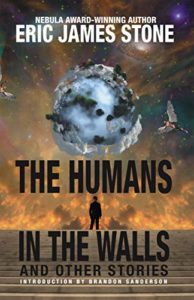 Eric James Stone. The Humans in the Walls and Other Stories. WordFire Press.
Eric James Stone. The Humans in the Walls and Other Stories. WordFire Press.
This emmersive collection contains twenty-seven tales of science fiction and fantasy, ranging from hard science fiction to fairy-tale fantasy, from humor to horror. Within these pages you’ll find supernatural beings, uploaded brains, psychic powers, space colonies, alternate timelines, aliens, superheroes, and giant AI starships that pay little attention to The Humans in the Walls.
Over fifty of Eric James Stone’s short stories have appeared in venues such as Year’s Best SF, Analog Science Fiction and Fact, and even the scientific journal Nature. His 2010 novelette, “That Leviathan, Whom Thou Hast Made,” won the Nebula Award for Best Novelette and was a finalist for the Hugo Award. His debut novel was the 2016 science fiction thriller Unforgettable. He received a political science degree at Brigham Young University and graduated from Baylor Law School.
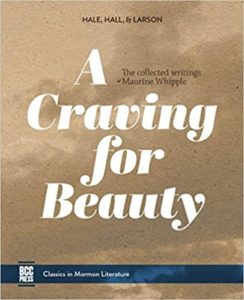 Maurine Whipple. A Craving for Beauty: The Collected Writings of Maurine Whipple. BCC Press. Edited by Veda Hale, Andrew Hall, and Lynne Larson.
Maurine Whipple. A Craving for Beauty: The Collected Writings of Maurine Whipple. BCC Press. Edited by Veda Hale, Andrew Hall, and Lynne Larson.
Maurine Whipple (1903-1992) was the author of the landmark Mormon novel The Giant Joshua (1941). She wrote many other remarkable short fiction pieces and magazine articles over the years, only a few of which have been published. This volume collects her published stories and her best previously unpublished work, including magazine stories about fascinating people and places in extreme corners of the intermountain west, reporting from within Short Creek during the 1953 polygamy raid, a war-era lecture questioning war, racism, and patriarchy, several short stories, and Cleave the Wood, the unfinished sequel to The Giant Joshua.

